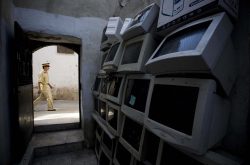The inability of Sawa and Alhurra to speak with critical populations in the Middle East and their emphasis on the most trivial of American pop culture have marginalized the United States and prevented a reasoned and substantive conversation between the United States and the Arab world, says former VOA Director Myrna Whitworth.
Read More »Columns
Picture perfect: How the story of Dubai’s other side can never be told
I hesitate to call myself a journalist. Technically, I am one, but I haven’t broken ‘news’ since the day I took up my position on Time Out in Dubai. Still, I take comfort in knowing that most journalists in the emirate are equally frustrated working in a media industry that ‘makes nice, not news,’ reports Dana El-Baltaji.
Read More »2007: A Fateful Year for America’s Voices?
There are several reasons why the new Democratic 110th Congress, the Bush administration, or both need to take a hard, new look at the American networks without delay, says Alan L. Heil Jr.
Read More »Bombs and broadcasts: Al Manar’s battle to stay on air
Paul Cochrane tracks Israel’s attempts to strike a lethal blow to Hizbullah’s satellite channel.
Read More »The long march of Pan-Arab media: a personal view
In all previous Arab-Israeli wars Israel had dominated on all counts. But in the 2006 war, the influence of the Israeli media on global opinion seemed to have been tempered by the greater range of Arab voices, argues Jihad Fakhreddine.
Read More »Lebanese women journalists brave war odds
Lebanese women journalists braved bombs, bullets and missiles to report the conflict between Hizbullah and Israel in the summer of 2006, sometimes surpassing their male colleagues’ coverage by providing insight into the conflict’s human nature, says Magda Abu-Fadil.
Read More »Arab blogs: Or how I learned to stop worrying and to love Middle East dictators
"The headline is a lie. I never did stop worrying about the Middle East and my hatred for its dictators is just as virulent as ever. But one thing has changed: I no longer feel the despair and indifference borne of years reporting on the region’s leaders. And that’s thanks to blogs," says Mona Eltahawy.
Read More »Publicizing the private: Egyptian women bloggers speak out
The real-world impact of blogs in the Middle East remains to be seen. But women bloggers stress that there is agency and empowerment in just being able to write, reports Sharon Otterman.
Read More »Talking back: Exiled Libyans use the Web to push for change
When Claudia Gazzini went in search of the Libyan blogosphere, she found neither the blogs nor the bloggers. But what she did find was an increasingly vocal exile community using interactive websites and forums to push for change in their homeland.
Read More »Illegal attack or legitimate target? Israel attacks Al Manar
The degree to which Israel’s attacks on Al Manar could be considered lawful and legitimate in international law depends largely on the actions of Al Manar and whether it played a role as an interested party on the battlefield, says Andrew Exum.
Read More » Arab Media & Society The Arab Media Hub
Arab Media & Society The Arab Media Hub









